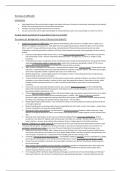Summary
Summary Lancastrians, Yorkists and Henry VII Complete PDF
- Course
- Institution
This PDF document is a complete set of notes covering the A-Level Edexcel History topic: Lancastrians, Yorkists and Henry VII from an A* student 2023. This unique document daws from a myriad of resources, ranging from numerous textbooks to specialist historians in the field, as well as my own per...
[Show more]



